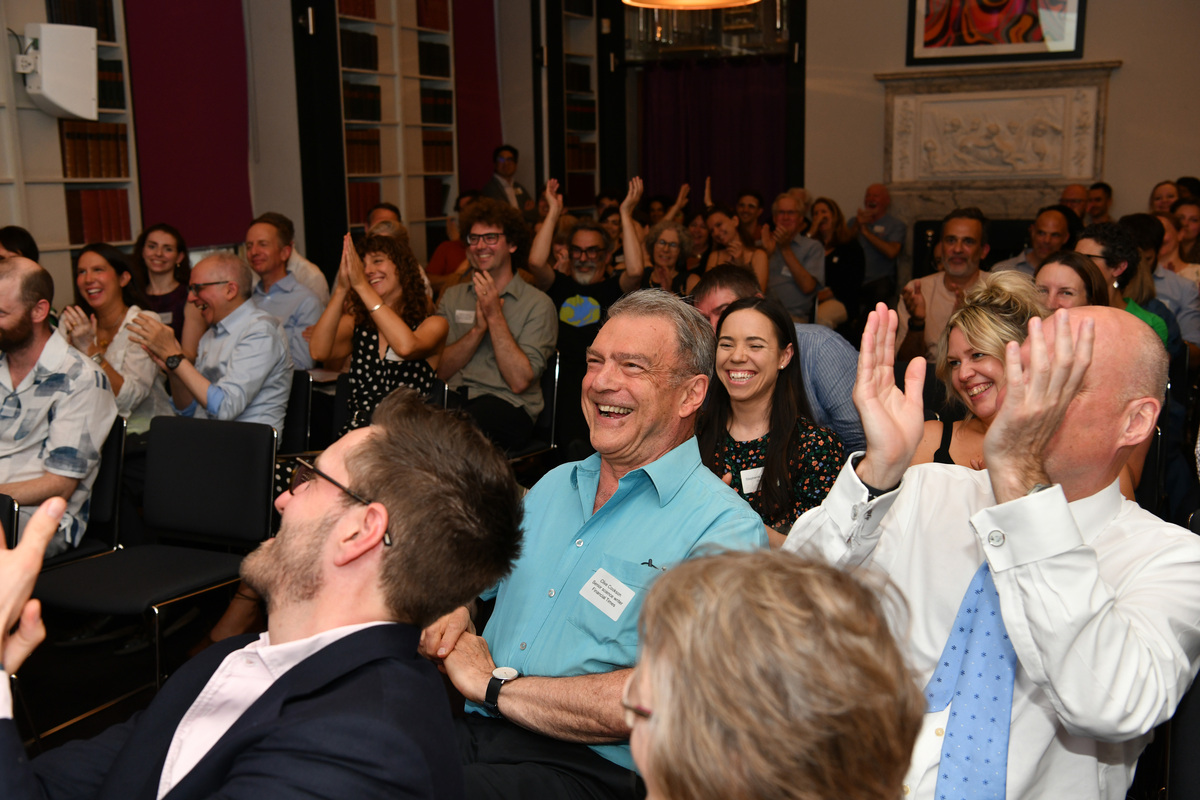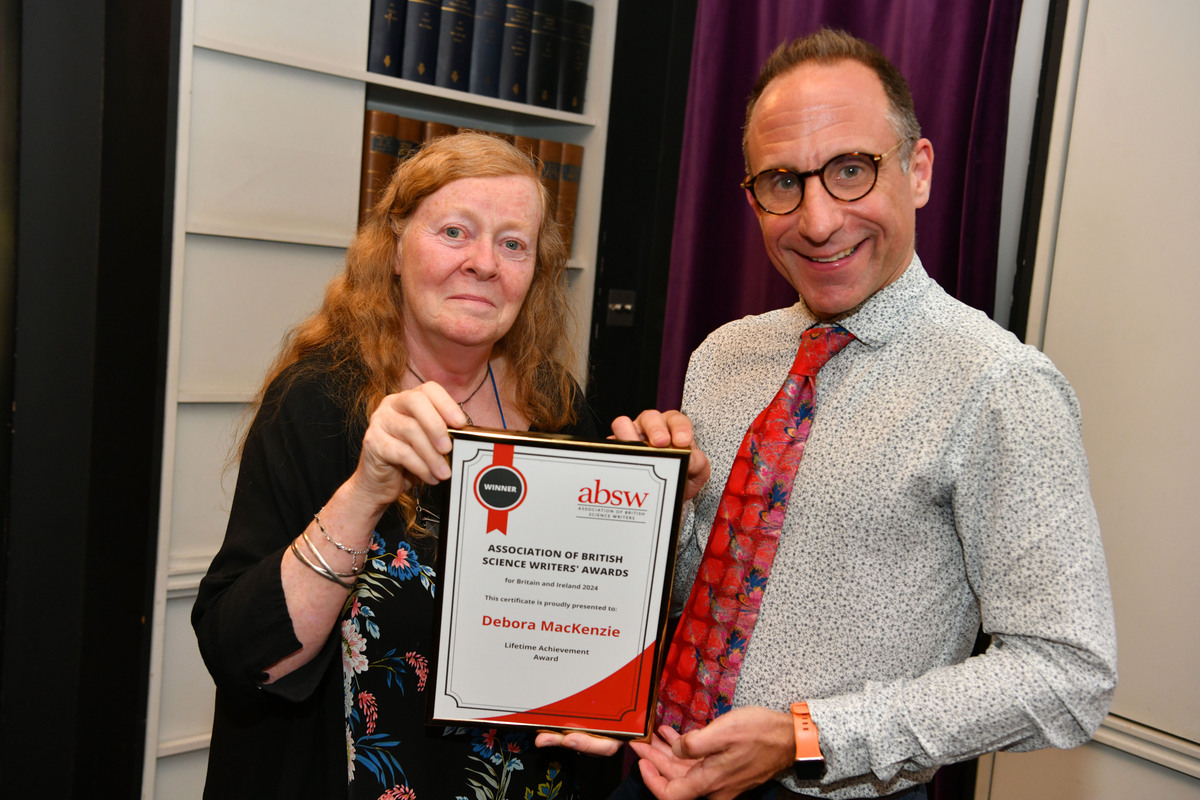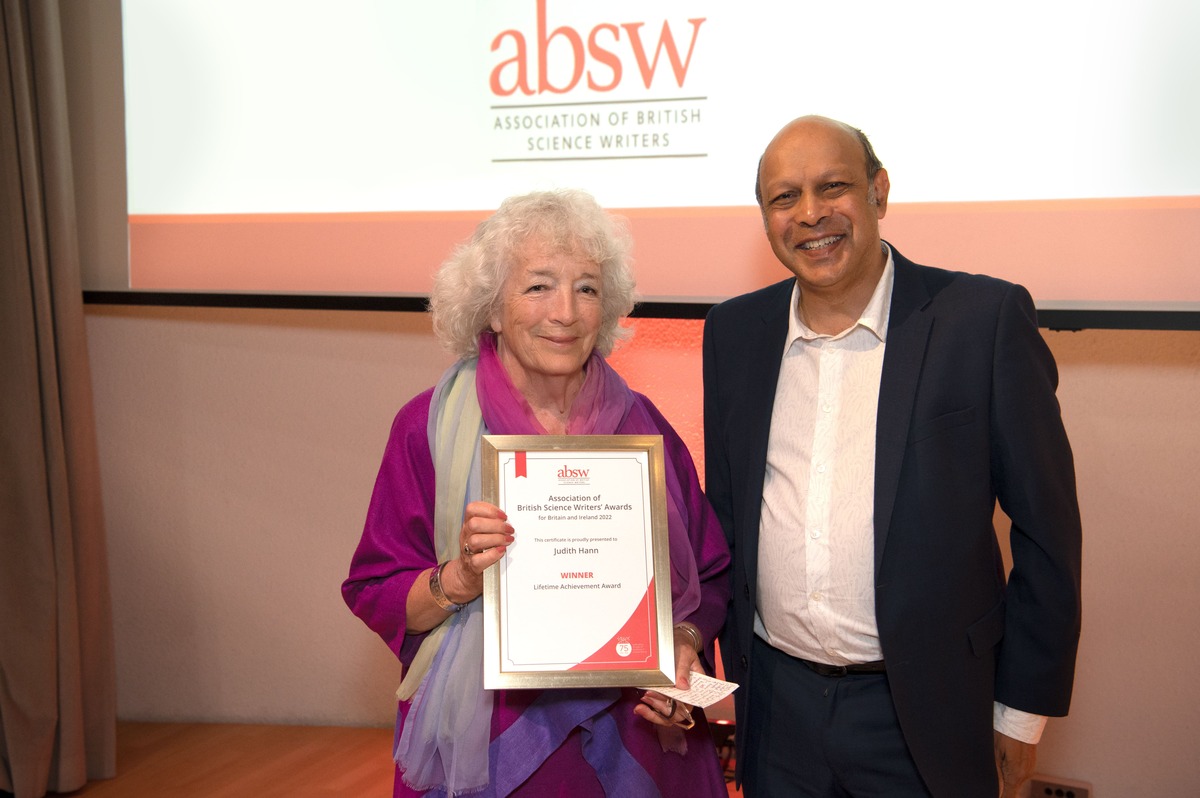ABSW Lifetime Achievement Award
***Make your nomination by 30 April 2026 for your candidate to be considered for the 2026 Award***
This award recognises contributions in leadership and service to science journalism or science writing, including but not limited to:
Championing independence and excellence in the reporting of science, medicine, engineering or technology
Communicating science, medicine, engineering or technology and holding them to account
Journalistic achievement and impact
Professional development of colleagues, including mentoring
Exemplary professional behaviour
The ABSW takes nominations from its members at any point in the year (for your candidate to be considered for the 2026 awards your nomination is required by 30 April 2026). Please email [email protected] with the following details:
Your full details, including job title, alongside full details of your nominee, including a statement that reflects on the bullet points above and outlines the nominee's suitability to receive the award.
The ABSW Board then considers all nominations and decides on an awardee in May/June each year. The award is not made every year, and is only made when an outstanding candidate is identified.

2025 Lifetime Achievement Award
Picture: Clive Cookson (in blue shirt) is announced as the winner of the award
Awarded to Clive Cookson, Financial Times Senior Science Writer and formerly Financial Times Science Editor.
Through his lifelong career in science journalism Clive has made an immeasurable contribution to excellence in the field and demonstrates the exact qualities and achievements that the ABSW wishes to acknowledge through its lifetime achievement award. Clive has worked as a journalist for his entire professional life, starting out at the Luton Post, moving through the Times Higher Education Supplement, The Times, and BBC Radio, finally joining the FT in 1987. In this time there are hardly any aspects of science he has not covered expertly, and in 2022 this was recognized through the 'ABSW British Science Journalist of the Year Award'.
The lifetime achievement award is not just for journalism however, and Clive has made key contributions to good relationships and understanding between scientists and the media through support for the ABSW Media Fellowships scheme for more than 10 years. The ABSW and science journalism community world wide are also indebted to his expert guidance on the steering group of the World Conference of Science Journalists, London 2009, that led to the great success of this key international event.
Andy Extance, Chair of the ABSW
Clive's current and former colleagues also sent their congratulations.
I am so thrilled to see Clive’s talents and achievements justly recognised with this prestigious award.
We all know he is a brilliant writer and journalist, able to consistently dig up and tell amazing stories with precision and elegance but it was not until I began writing for the FT that I got to know him better. He is everything one could wish for in a colleague: calm, vastly knowledgeable, generous, wise and supportive. I cannot tell you how much I valued his razor-sharp judgment during the pandemic.
But, in addition to his formidable record as science editor for a global newspaper, he is also a genuinely lovely person: kind, funny and ridiculously modest, with a sense of perspective that is rare in our ultra-competitive profession.
Congratulations Clive - I look forward to continuing to learn from the best in the business!
Anj Ahuja, contributing writer at the Financial Times
From first-class Oxford chemist to the FT’s voice of science, Clive Cookson has spent decades translating complexity into clarity—making the frontiers of research accessible to boardrooms, policymakers, and curious minds alike. Despite his 1989 scoop that unleashed the cold fusion frenzy (sorry, Clive!), what stands out most when I reflect on his remarkable career is the calm precision with which he’s illuminated the science shaping our world. Perhaps it’s the chemist’s gift— having a viewpoint that lies between the simplicity of physics and the messiness of biology—that has made his journalism so consistently insightful and enduring.
Roger Highfield, Science Director at the Science Museum Group and Honorary President of the ABSW
For about as long as I can remember, Clive has been FT science coverage. When we were science editors together, he was the peer I saw as my worthiest rival for science & public policy reporting, and when I made the switch to comms at Wellcome, he was a reporter you could always trust to get the kernel of the story, and to tell it straight, helping readers to understand what really mattered about it.
Mark Henderson, former Science Editor, The Times, now Executive Director of Corporate Affairs & Engagement, Wellcome Trust.
Clive last won an ABSW award in 2022 when he was awarded British Science Journalist of the Year, over the years he has won three other awards from the ABSW.
Clive's award was presented by Pallab Ghosh, Science Correspondent at BBC News and former Honorary President of the ABSW.

2024 Lifetime Achievement Award
Awarded to Debora MacKenzie, freelance writer
In his nominating statement ABSW Chair Andy Extance said:
Debora's contribution on pandemic reporting, in particular in forewarning about covid-19 and holding governments to account for their failures in responding to it, is a journalistic achievement worthy of this award.
Many of Debora's former colleagues also wanted to pass on their thoughts and best wishes.
Damian Carrington, Environment Editor, The Guardian
I had the privilege of working with Debora for seven years at New Scientist. Her unique combination of passion, energy and encyclopaedic knowledge was awe-inspiring and produced exemplary reporting. She was also great fun!
Philip Ball, Science Writer and Editor
This is a fabulous choice of course! Strangely, I had never actually met Debora until she came to my book launch in March, although we’d corresponded. So, I can’t claim to know her well, except through her work. But of course, that work is exceptional. The first time I really delved more deeply into it was when reviewing her book on Covid, which still astonishes me for its depth and clarity given that it was written almost instantly. I don’t imagine anyone else could have done that. I’ll confess that when it became clear to me - I think it must have been in February 2020 - that Covid was going to be immense and world-changing, I toyed for a few days with the idea of trying to write something fast. I’m so glad that I abandoned that foolish idea quickly, because it would never have approached the authority or insight that Debora brought to bear. And of course, that was only possible because she has spent so many years becoming so profoundly informed about infectious disease. This ABSW award couldn’t be more richly deserved.
Fred Pearce, Science Writer and Author (and a previous ABSW Lifetime Achievement winner)
Debora showed up at Lawrence McGinty's New Scientist leaving drinks in 1982 – and never left. She has always had a great news nose, forensic skills in understanding the science, and attitude. Especially attitude. Reporting from the hospitals of Bhopal or an erupting Mount Etna, drought-torn Ethiopia or the end of civilization, complexity or emerging diseases and the origins of the Covid crisis, she does science journalism like nobody else. Interrogating science, where others just reported it. Nobody has done it better at New Scientist – or for longer. Oh, and if you want not just to report the next epidemic, but to learn how to stop it, read her book on the topic. As the great Tim Harford says on the cover, "you could not hope for better".
Liz Else, Senior Culture Editor, New Scientist
For someone with a terrific sense of fun, Deb Mackenzie has spent a lot of time in some very dark places.
At New Scientist magazine, where we both worked for years, she was known for worrying us all about everything from antibiotic resistance and bird flu to arms control and Ebola – and even to the collapse of civilisation itself.
But the biggest feather in a well-festooned cap must be her increasing insistence that a pandemic was just round the corner. We took her seriously, but who knew when it would arrive and in what form?
In December 2019, we found out as China told the World Health Organization about a cluster of cases of “viral pneumonia” in the city of Wuhan, cause unknown. That cause turned out to be SARS CoV-2, the coronavirus behind covid-19.
Somehow, in the thick of it, Deb managed an extraordinary feat. In just two months (think of it), she wrote the first book about the disease, COVID-19: The Pandemic that Never Should Have Happened, and How to Stop the Next One. It was published in July 2020.
At New Scientist and within the union, we look forward to her future career with great interest.
Well done, Deb!
Brief Biography
After postgraduate work in scientific research and freelancing for a range of newspapers and magazines, Debora worked almost exclusively for New Scientist, the British scientific weekly, for 38 years, covering a wide variety of subjects. She then switched to books. "Covid 19: the pandemic that never should have happened and how to stop the next one" (Hachette) appeared at the height of the first wave of Covid in July, 2020; an expanded version, "Stopping the next pandemic", appeared in 2021. In addition she occasionally writes for other publications and scientific conferences. She specialises in biomedical and social issues, especially infectious disease, food and agriculture, arms control, the role of complexity in political and social development, and the risk of collapse. She has written thousands of news stories, opinion and in-depth feature articles during her career. Many were exclusive. Some won awards. A few even managed to change some small bit of the world that needed the spotlight of responsible journalism. She plans to continue trying to do that.

2022 Lifetime Achievement Award
The 2022 Lifetime Achievement Award went to Judith Hann, best known for her work on the TV programme, Tomorrow’s World. At the awards ceremony Judith gave an inspiring speech on the hurdles she had faced as a woman in the male dominated world of science journalism in the 60s/70s and 80s. It was clear that this trailblazer for women had inspired many in the audience to go into science journalism. Thankfully times have clearly changed as the list of finalists and winners in 2022 was dominated by women journalists and broadcasters. You can watch the whole of the ceremony here, including the amazing Lifetime Achievement award presentation to Judith Hann from 1h23 mins.
In his nominating statement Andy Extance, Chair of the ABSW said:
I'd like to nominate Judith Hann for our lifetime achievement award. The name may or may not ring a bell - she was a Tomorrow's World presenter for 20 years. In 1967, she won the ABSW's regional award while working as science correspondent and feature writer for the Northern Echo in Darlington. She won another ABSW award in 1974, the year she started work on Tomorrow's World. From her agent's website: "Judith has also written and presented programmes and series of her own for TV and radio on healthy food, the science of ageing, renewable energy. Judith has always carried on her writing career alongside broadcasting work and has written seven books to-date including her new book HERBS, plus several books on science, medicine, health and food, and How Science Works, which has been translated into twenty languages and has sold over one million copies worldwide. She also worked for the Royal Society for 12 years, training hundreds of the world’s leading scientists how to explain their work in an exciting way to the public. She also runs a media training and communications skills company with her husband, teaching individuals how to make the most of themselves, and companies how to make the most of the media. Durham University awarded Judith Hann an Honorary Doctorate of Civil Law for what the citation described as her “outstanding contribution to science journalism”." Given that Judith has an exemplary record as a science journalist, mainstream science communicator and media trainer, she is an excellent candidate for the award. It's odd to me that she's been overlooked before.
The 2021 Lifetime Achievement Award
Awarded to former ABSW Chair, Wendy Barnaby
Citation, read by ABSW President Pallab Ghosh:
"I’m very pleased to present the lifetime achievement award, which goes to a member of the UK journalism science community who has consistently set an exemplary standard in his or her work throughout their career.
This year the award goes to a journalist who has been a great example for women looking to make a career in science journalism. Most recently she has been teaching on Imperial College’s Science Communication Masters course. But she’s done excellent work for many outlets and institutions including Nature, New Scientist, the Times Higher, the Royal Society, European Commission and Grantham Institute for Climate Change. She has contributed to decades of science programming on BBC and ABC radio. She has made many audio and video podcasts for the British Journal of Surgery, the Royal Society and the British Psychological Society. From 2001 to 2014 she was the Editor of People & Science, the magazine of the British Science Association.
Perhaps most importantly she’s never shied away from controversial reporting. You can see that in her book, The Plague Makers, an introduction to biological warfare, and her reporting on The Water Wars in Nature, stressing that conflicts really were originating from access to water.
She has media-trained hundreds of scientists in organisations including the Biotechnological and Biological Sciences Research Council (BBSRC), the National Trust and the British Psychological Society. She has served as an adviser to the BBSRC as a member of its Bioscience in Society panel, and on the BBSRC’s Institute Assessment panel.
She’s also done great service to the ABSW itself, long serving on our committee, becoming our second female chair from 1993-1995, and judging our awards. She helped set up the Wellcome Trust bursaries, which funded science journalism training and placements."
Former winners of the ABSW Lifetime Achievement Award
2025 Clive Cookson
2024 Debora MacKenzie
2022 Judith Hann
2021 Wendy Barnaby
2020 Robin McKie
2019 Philip Campbell
2018 Steve Connor
2017 Andy Coghlan
2016 Deborah Cohen
2014 Lawrence McGinty
2013 Dick Ahlstrom
2012 David Dickson
2011 Fred Pearce
2010 Geoff Watts
2009 John Gribbin
2005 David Attenborough
2004 Tim Radford





